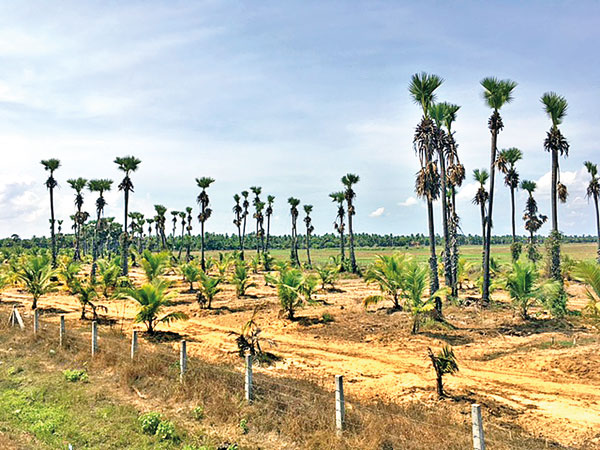News
Experts push for climate-smart agriculture to minimise damage to crops from extreme weather
View(s):By Wasantha Ramanayake
The anticipated paddy harvest often fails to reach the target due to climate-change-related untimely heavy rains, lament dry zone farmers who also lose a significant part of their crops due to elephant attacks, and, of late, the lack of fertiliser.
In Polonnaruwa, farmers say the losses they incur due to successive failed harvests are increasing their debt burden and pushing them further into misery.
Asked about the unpredictable weather, the Meteorological Department’s climate change studies chief Anusha Warnasuriya said variations in the monsoon rainfall could be caused by climate change.

Extreme weather patterns: Innundated paddyfield and below, drought-hit plantation. Pic by Ramesh Madushanka
Extreme weather events such as longer and severe droughts and heavy rains causing climate chaos are more frequent now due to climate change, she pointed out.
“We will experience more and more heavy rains. Heavy rains of above 100mm have become an everyday event, whereas 75 mm is the average annual rainfall in some countries,” Ms. Warnasooriya added.
As a result of various weather phenomena which develop in a short period, long-term weather forecasts mostly proved to be wrong, the expert said.
To counter this problem, the Met Department now issues only weekly forecasts. Such forecasts are useful for climate-smart agriculture, in which farmers use short-term forecasting to minimise possible loss, Ms. Warnasooriya said.
She added that climate-smart agriculture could be the future of agriculture, with farmers, acting on weekly weather forecasts, managing cultivation, and using less water. Farmers are advised as to which crops they should plant by agricultural experts to survive extreme weather events which are now more frequent.
“In climate-vulnerable countries such as Bangladesh and Sri Lanka, farmers should adapt their cultivation to changing climate by varying the water management, allowing water to drain quickly in rainy weather and retain water in dry weather. 
“We are more vulnerable because we get more energy from the sun in the tropics than the developed countries in the mid-latitudes, where the climate is less susceptible to changes,” she said, explaining reasons for what critics describe as unreliable weather forecasts.
Ms. Warnasooriya said the department, which still uses old technology, will soon get advanced technology to deliver more reliable forecasts.
Environment Ministry Secretary Dr. Anil Jasinghe also endorses climate-smart agriculture projects designed to support farmers who are vulnerable to climate change.
One component of the discussions of climate summit COP27 in the Egyptian city of Sharm el-Sheik is loss and damage caused by climate disasters which could not be avoided either by adaptation or mitigation, Dr. Jasinghe said.
“This is a priority for climate-vulnerable countries such as Bangladesh, Sri Lanka, and small island nations in the Pacific,” he noted.
He blamed the developed countries for not being keen to come up with solutions, though they spend lavishly on the Ukraine war, which has escalated the food insecurity crisis in the developing world.
In terms of the nationally determined commitments promised by Sri Lanka at the last summit, Sri Lanka is on course to reduce CO2 emissions from electricity generation by targeting a 70 percent power output from renewable energy sources in the coming years, Dr. Jasinghe said. Sri Lanka is also taking steps to reduce CO2 emissions from transport by 14.5%, while 10 percent of the emission cut is conditional and will be implemented with external support by 2030.
The ministry secretary also reveals that the roadmap for achieving carbon neutrality by 2050 will be completed in four months.
Although discussions usually make slow progress, African countries are strongly lobbying for technology transfer and financial assistance to develop climate-resilient smart agriculture, Mr. Jasinghe said.
The Agricultural Department’s Agro-Climatology and Climate Change division Assistant director Aruni Abeysekera said the unit prepares farmer advisories every month based on the weather reports from the Met Department.
“We advise Eastern Province farmers to prepare their lands using less water since there is less rainfall in that province. To prepare the advisory, we started getting input from the Irrigation Department and the Mahaweli Authority from last year,” she said stressing the need to further develop the system.
Sri Lanka, as a member of the United Nations and as a signatory to the Paris Agreement, is legally bound to take measures to enhance and elevate climate adaptation and mitigation of potential climate impacts, environmental lawyer Dr. Raveendranath Dabare pointed out.
Dr. Dabare also stressed the need for a legal framework to enforce the Paris convention, since the most vulnerable groups are children and the poor.
The number of days passing extreme heat of 35C rise from baseline of 20 days to 100 days by 2090s and extreme heat has its negative effects on human health particularly on labourers and children and that the poor living in urban areas without proper cooling, he said.
The best way to say that you found the home of your dreams is by finding it on Hitad.lk. We have listings for apartments for sale or rent in Sri Lanka, no matter what locale you're looking for! Whether you live in Colombo, Galle, Kandy, Matara, Jaffna and more - we've got them all!

